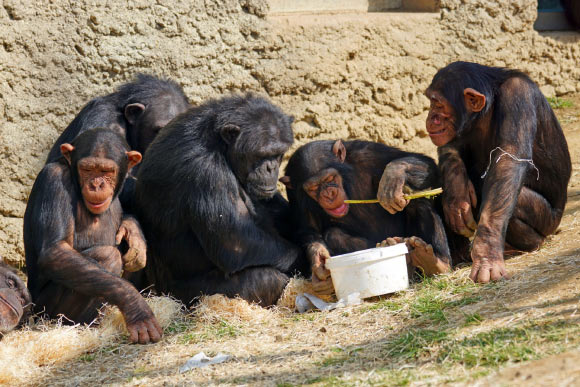Chimpanzees share our human ability to amass knowledge, a new study led by a University of St Andrews researcher has found.
The ability to achieve great feats by building on the work of others is known as cumulative culture.
Until now humans, baboons, and pigeons were the only species thought to be capable of it.
Prof. Andrew Whiten, from the University of St Andrews School of Psychology and Neuroscience, and his colleagues from the University of Texas and the University of St Andrews presented chimpanzees with a new opportunity: sucking through straws to get juice from a large container just outside their enclosure.
“We investigated whether one of human’s two closest living primate relatives, chimpanzees, are capable of a degree of cultural ratcheting by exposing captive populations to a novel juice extraction task,” the researchers explained.
To create the potential for cumulative culture, a range of different objects were available: from sticks to dip in the juice, to various tubes that could be used as straws.
The most complicated tool was one which needed to be unfolded, with a valve which needed to be unscrewed to create a long straw to reach the juice from the deep container.
Chimpanzees presented only with this complex option failed to exploit it — it was a very novel challenge for ape minds.
However in other groups, where one chimpanzee had been trained to use the complicated tool, other chimpanzees watched and copied them, with this behavior then spreading through the group.
However, other groups not provided with a trained member, did see some chimpanzees created this complex behavior by themselves by pooling of partial discoveries by different individuals who had already mastered using the simpler straws.
This discovery shows that complex traditions can arise through collective understanding and cumulative practice.
“Perhaps the most fundamental thing this study shows is that a group of chimpanzees can appear more intelligent than any single individual — together they can create more advanced steps in cultural evolution,” Prof. Whiten said.
“Our chimpanzees were capable of learning increasingly complex behaviors by observing knowledgeable individuals,” said study first author Dr. Gillian Vale, from the University of Texas.
“This and other recent studies are beginning to show that some non-human animals are better equipped to improve the complexity of their cultural behaviors over time than was previously believed.”
The authors emphasize that cumulative progress occurred only when a challenging ‘ecological change’ was created by the experimenter: simple tools the chimps had been using became no longer available.
They suggest this is significant for understanding what may have happened in the course of human evolution as new skills were required to deal with radical ecological changes as forests gave way to savannas, with cumulative culture accelerating particularly during ice ages.
The findings were published recently in the journal Evolution and Human Behavior.
Source: Sci News

































Leave a Comment
You must be logged in to post a comment.